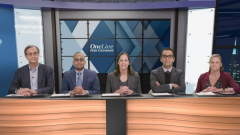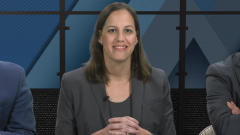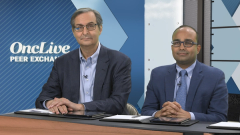
Overview of Molecular Testing in Metastatic Colorectal Cancer (mCRC)
Experts in metastatic colorectal cancer management highlight the role of molecular testing and testing modalities available in the academic and community settings.
Episodes in this series

Transcript:
Kristen K. Ciombor, MD: Hello, and welcome to this OncLive® Peer Exchange® titled “Diagnosis and Treatment of Metastatic Colorectal Cancer with a Focus on HER2-Positive Disease.” I’m Kristen Ciombor, an associate professor of medicine in the division of hematology and oncology at Vanderbilt University Medical Center [in Nashville, Tennessee]. I’m joined by a panel of experts in the field of colorectal cancer. I’d like to welcome my esteemed fellow panelists to introduce themselves. Dr Hubbard?
Joleen M. Hubbard, MD: Hi, I’m Joleen Hubbard. I’m a GI [gastrointestinal] medical oncologist at the Mayo Clinic Comprehensive Cancer Center in Rochester, Minnesota.
Kristen K. Ciombor, MD: Dr Kasi?
Pashtoon M. Kasi, MD: Pashtoon Kasi at Weill Cornell Medicine [in New York, New York].
Kristen K. Ciombor, MD: Dr Raghav?
Kanwal P. Raghav, MD: I’m Kanwal Raghav, 1 of the associate professors in GI medical oncology at The University of Texas MD Anderson Cancer Center in Houston, Texas.
Joel R. Hecht, MD: I’m Randy Hecht. I’m a GI oncologist at UCLA [University of California Los Angeles] in Santa Monica, California.
Kristen K. Ciombor, MD: Welcome, everyone. Thank you for joining me. We’re going to discuss a number of updates in the diagnosis and treatment of metastatic colorectal cancer with a focus on the treatment of HER2 [human epidermal growth factor receptor2]–positive disease. We’ll discuss the latest data in the context of CRC [colorectal cancer] guidelines and their impact on clinical practice. Let’s get started on our first topic.
When we’re thinking about doing molecular testing in colorectal cancer, in particular in metastatic disease, there are a number of things that we think about. Colorectal cancer is very prevalent unfortunately, with over 150,000 cases in the United States projected for 2023, with a 2:1 prevalence of colon vs rectal cancer. We’re also seeing it younger, and the patients we see in the clinic span many decades in terms of age and stages. We tend to see more localized colon cancer and rectal cancer, but unfortunately a good percentage [of patients still] present in the metastatic setting or recur after definitive treatment for localized disease. We need to think about how best to treat these patients and hopefully cure more patients with our research and our advancements in drug development. I want to start with molecular testing and talk a little about how we think about this. Dr Hubbard, what do you think about in terms of molecular drivers that we need to consider in colorectal cancer? How do we test for them?
Joleen M. Hubbard, MD: First and foremost, we need to test every GI cancer for deficient mismatch repair. This indicates that they might have microsatellite instability [MSI], which would make patients a candidate for immunotherapy. Also, it identifies potential for an inherited syndrome called Lynch syndrome, and we need to identify those families. That’s the first molecular marker testing that I’m doing. Then I test everybody with next-generation sequencing [NGS] at first diagnosis of metastatic disease. The main drivers I’m looking for up front are RAS mutations, BRAF mutations, and HER2 amplifications because those have the most predictive markers that we have in terms of response to our current treatments. But I also like to identify any other mutation that the patient’s cancer has that may identify a clinical trial opportunity in the future.
Kristen K. Ciombor, MD: Thank you. Dr Hecht, what do you think about testing? Do you have a preference? Do you do next-generation sequencing for everyone? Do you do IHC [immunohistochemistry]? What’s your workflow?
Joel R. Hecht, MD: This is something we’re having ongoing discussions about because it’s changing. Historically, all our patients, whether they had metastatic disease or not, had reflex testing of the tumor tissue—originally for MSI and then for IHC. I’m looking for deficient DNA mismatch repair. The question has come up about individual testing for individual markers vs NGS. In fact, together with my colleagues, we’ve been having multiple discussions with our pathologists at UCLA, and it’s the way forward. The older panels that we had were ones that probably have the most utility, like RAS, BRAF, and HER2.
The question comes up about next-generation sequencing. There are some problems with that. You mentioned the word workflow. First, not all our patients have had their tissue at UCLA. Everyone is from a large academic center, where it’s easier if the original biopsy was done at your institution. But you may be getting it from a surgicenter where they sent from the pathology or from a small hospital where the patient had their original tissue.
The other problem that comes up with NGS—we’re trying to bring it back in house to a certain extent—has been time, especially in first-line therapies where that may make a difference depending on whether the patient has a RAS mutation. The question comes up, how long does it take to get that? The third thing we haven’t figured out, in terms of how it all goes together, would be tissue-based assays vs ctDNA [circulating tumor DNA], which may come back sooner. It’s in flux. We tend to do NGS on all our patients. The question is exactly when and how, and that’s up in the air. I’m curious how others are doing it.
Kristen K. Ciombor, MD: Yes, I am too. I’d like to hear everybody’s opinion on that and what your workflow is and where you think we can improve. Dr Raghav?
Kanwal P. Raghav, MD: The feasibility of doing NGS in large academic centers is clearly established. There’s definitely truth that NGS can give you a wider panel in 1 go. It sets you up not only for the biomarkers in clinical practice but also for drugs that you could use for clinical trials that you might not have thought of. Whether this can be adopted on a wide scale across communities or in countries outside the United States has yet to be determined because the cost can sometimes be prohibitive.
Kristen K. Ciombor, MD: Yes, that’s a great point. How about you, Dr Kasi? How are you doing NGS or IHC? Do you do a combination depending on the gene?
Pashtoon M. Kasi, MD: The IHC part is reflexive…and with the HER2, that’s a quick reflexive test that’s been adopted by different pathologists. It’s similar to upper GI, where you’re checking for the mismatched repair and looking for HER2…. In some ways, colorectal [cancer] with the HER2 data is something for which you can get a quick readout in the reflexive IHC setting.
I want to segue from Dr Hecht’s comment on getting the tissue, especially when the biopsy is elsewhere. This liquid biopsy part or circulating tumor DNA, as we’re getting beyond concordance, depending on the tissue type with colorectal [cancer], it has a lot of shedding. It has value in terms of integrating into a rapid readout, particularly when incorporated in the first-line setting.
Kristen K. Ciombor, MD: Dr Hubbard, do you agree? Do you use blood-based testing as well as tissue, or do you have a preference for 1 over the other?
Joleen M. Hubbard, MD: At Mayo, we’re starting to transition to doing a lot of next-generation sequencing colorectal-specific panels at diagnosis, so we can do everything with 1 test. A lot of times, if they’ve come diagnosed from another center, then you’ve got to quickly track down their IHC test to decide if you’re going to rebiopsy for next-generation sequencing with tissue vs circulating tumor DNA. It’s a bit of a struggle, but for the most part, we’re trying to do NGS for everyone up front. [We try] to capture all the testing with 1 test.
Kristen K. Ciombor, MD: That’s great.
Transcript edited for clarity.







































